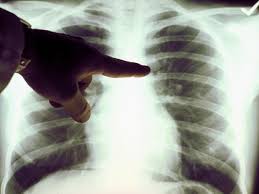- Home
- Editorial
- News
- Practice Guidelines
- Anesthesiology Guidelines
- Cancer Guidelines
- Cardiac Sciences Guidelines
- Critical Care Guidelines
- Dentistry Guidelines
- Dermatology Guidelines
- Diabetes and Endo Guidelines
- Diagnostics Guidelines
- ENT Guidelines
- Featured Practice Guidelines
- Gastroenterology Guidelines
- Geriatrics Guidelines
- Medicine Guidelines
- Nephrology Guidelines
- Neurosciences Guidelines
- Obs and Gynae Guidelines
- Ophthalmology Guidelines
- Orthopaedics Guidelines
- Paediatrics Guidelines
- Psychiatry Guidelines
- Pulmonology Guidelines
- Radiology Guidelines
- Surgery Guidelines
- Urology Guidelines
Smokers who undergo a CT scan of their lungs more likely to quit

New research published in the scientific journal Thorax has found that smokers who undergo a CT scan of their lungs are more likely to quit smoking.
Lung cancer is one of the most common and serious types of cancer and has the highest mortality of all cancers in the UK. Around 44,500 people are diagnosed with the condition every year in the UK.
The smoking cessation analysis of the UKLS trial, was led by researchers at Cardiff University working with the University of Liverpool's Institute of Translational Medicine, King's College London and Queen Mary University of London, involved 4,055 participants aged 50 to 75.
15% per cent success rate
The group was split into those who underwent low-dose CT screening for early detection of lung cancer and a control group who did not undergo screening.
Of the smokers who took part in the screening, 10 per cent had successfully quit after two weeks, and 15 per cent had quit after two years -- both higher than the 5% rates found in the control group.
The UK Lung Cancer Screening pilot trial is the first to assess the feasibility, cost-effectiveness and behavioural impact of lung cancer screening, using a single low-dose CT screen on a high-risk population in the UK.
Licence to smoke
Professor John Field, University of Liverpool's Clinical Professor of Molecular Oncology, Chief Investigator of the UK Lung Cancer Screening Trial and Principal Investigator of the Liverpool Lung Project, said: "Lung cancer continues to be the leading cause of cancer mortality worldwide.
"The findings of this study dispute the belief that a negative screening result offers a "licence to smoke". Engaging with lung screening can give smokers an opportunity to access smoking cessation support -- at a time when they are likely to be more receptive to offers of help."
Dr Kate Brain, from Cardiff University, said: "Our trial shows that CT lung cancer screening offers a teachable moment for smoking cessation among high-risk groups in the UK.
"We now need evidence about the best ways of integrating lung cancer screening with stop-smoking support, so that services are designed to deliver the maximum health benefits for current and future generations."
The full study, entitled 'Impact of low-dose CT screening on smoking cessation among high-risk participants in the UK Lung Cancer Screening Trial'
For more details click on the link : http://thorax.bmj.com/content/early/2017/07/14/thoraxjnl-2016-209690

Disclaimer: This site is primarily intended for healthcare professionals. Any content/information on this website does not replace the advice of medical and/or health professionals and should not be construed as medical/diagnostic advice/endorsement or prescription. Use of this site is subject to our terms of use, privacy policy, advertisement policy. © 2020 Minerva Medical Treatment Pvt Ltd